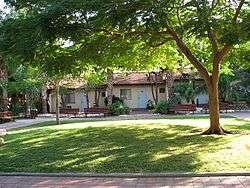Almog
| Almog | |
|---|---|
 | |
 Almog | |
| Coordinates: 31°47′22.91″N 35°27′39.96″E / 31.7896972°N 35.4611000°ECoordinates: 31°47′22.91″N 35°27′39.96″E / 31.7896972°N 35.4611000°E | |
| Council | Megilot |
| Region | Dead Sea |
| Affiliation | Kibbutz Movement |
| Founded | 1977 |
| Founded by | Nahal |
| Population (2015)[1] | 207 |
Almog (Hebrew: אַלְמוֹג, lit. Coral) is an Israeli settlement and a kibbutz near the northwestern shores of the Dead Sea in the Jordan Rift Valley in the West Bank. It is under the jurisdiction of the Megilot Regional Council. In 2015 its population was 207. The international community considers Israeli settlements in the West Bank illegal under international law, but the Israeli government disputes this.[2]
History
Initially established as a Nahal settlement in 1977, Almog became a kibbutz in 1979. It was named after Yehuda Kopolevitz Almog, a Third Aliyah pioneer who founded the potash mining industry which developed into the Dead Sea Works in Sodom.[3] In the 1930s, Almog was one of the founders of the nearby kibbutz Beit HaArava.
Economy
The kibbutz runs a guesthouse and spa. On the grounds of the kibbutz is a small museum displaying copies of the scrolls found in Qumran.[4] The kibbutz grows a variety of experimental crops for export.[5]
References
- ↑ "List of localities, in Alphabetical order" (PDF). Israel Central Bureau of Statistics. Retrieved 16 October 2016.
- ↑ "The Geneva Convention". BBC News. 10 December 2009. Retrieved 27 November 2010.
- ↑ Dead Sea Works
- ↑ Kibbutz museum
- ↑ Economy of Almog